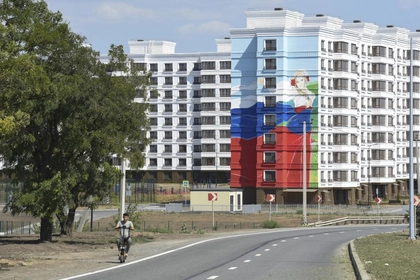Valeriy Kondratiuk, who was head of Ukraine’s Military and Foreign Intelligence agency from 2020 to 2021, said that Russian spymasters in the years leading up to invasion had built an extensive network of active and sleeper spies across Ukraine, most recruited from occupied territories in the east of the country, following Russia’s first invasion of Ukraine in 2014.
Russian spymasters for years employed old school KGB tactics, such as propaganda, blackmail, false flags and turning people with grudges against the government to place operatives near or inside sensitive sites across Ukraine, but cash was the key tool, Kondratiuk said.
JOIN US ON TELEGRAM
Follow our coverage of the war on the @Kyivpost_official.
“Above all, political corruption was accomplished with money – Russia had billions of dollars allocated for such subversive work and creation of conditions in every possible sphere – political scientists, propaganda, and pro-Russian forces, but the most important thing was the creation of a network of agents in Ukraine, primarily in the government,” he said.
A prime mission for the agent network was, in case of war, to provide Moscow precise grid locations of critical Ukrainian military infrastructure for future missile and bomber strikes, Kondratiuk said.
“People from the occupied territories were confused or misled, sent even earlier as refugees or temporarily displaced persons, who [then] found work near the most important military facilities or critical infrastructure to conduct this reconnaissance. Then during the attack on Feb. 24, they turned on special devices to guide Russian missiles,” Kondratiuk said.

Ukraine’s Usyk Beats Fury in Heavyweight Championship Rematch
But when Ukraine’s military and armed citizenry chose to fight invading Russian forces, and the Ukrainian government neither fled Kyiv nor agreed to surrender to Kremlin ultimatums, many members of Russia’s carefully-built secret agent network in Ukraine went underground and cut off all contact with their handlers, he explained.
“These agents in Ukraine were pro-Russian and were in touch with pro-Russian special services at the beginning of the war. They were waiting, but when they saw that Ukraine did not fall, they got scared. Most of them stopped contacting their case officers, and it's a big problem for the Russians to restore contact,” Kondratiuk added.
Kremlin decision-makers at the outset to the war were further misled by their primary link to the agents they had operating in Ukraine: senior members of a pro-Russia government that had fled the country in February 2014, following the massive pro-democracy Maidan protests.
Viktor Yanukovych, the former convict who was president of Ukraine at the time, along with other members of his administration in effective exile in Russia, not only actively assisted Russian intelligence agencies in locating and putting to work potential agents, but exaggerated those agents’ ability to collect useful intelligence and carry out sabotage, Kondratiuk said.
Russian national intelligence agency officers working with Yanukovych and other members of his ousted government were almost certainly misled to believe Ukrainian public desire for Russian rule was wide-reaching, when in fact it was negligible even before the invasion, he said.
Kondratiuk said Ukrainian national intelligence believes Ukrainian oligarch and former pro-Russia politician Viktor Medvedchuk, who had chosen his close friend Vladimir Putin to be his daughter’s godfather, was widely reported to be in charge of Kremlin spy operations in Ukraine. While he was most likely not in charge of the failed agent network, he probably benefited from its work.
“I don’t think Medvedchuk was the head of the Russian network of agents. He was the head of the pro-Russian forces. The agents gathered information directly about our capabilities in the military-industrial sphere. Still, all these agents worked to promote these pro-Russian forces that Medvedchuk led in Ukraine and brought him to power,” he said.
Medvedchuk previously headed the party Opposition Platform for Life party, which was banned in Ukraine last June. He was ordered arrested by the Security Service of Ukraine (SBU) on treason charges. According to the investigation, the politician is linked to coal smuggling from the self-proclaimed Donbas republics of the Donetsk and Luhansk.
After Feb. 24, 2022, Medvedchuk tried to flee Ukraine. Ukrainian secret police caught the fugitive Medvedchuk in April. He was extradited to Russia in September as part of a prisoner swap between Kyiv and Moscow.
The Ukrainian Prosecutor-General’s Office has said that charges against Medvedchuk linked with his activities among pro-Russia elements in Ukraine remain open. Aside from treason, he is alleged to have conspired with Moscow to undermine Ukrainian economic security in 2014-2015. In January 2023, Ukraine’s parliament voted to strip Medvedchuk, a former member of the legislature himself, of Ukrainian citizenship.
Medvedchuk is one of the highest-profile suspects in ongoing Ukrainian government investigations into collaboration with Russia. Since the beginning of Russia’s full-scale invasion, the State Bureau of Investigation has investigated 1,232 criminal proceedings for crimes against the foundations of national security. There are 984 criminal proceedings on high treason, 200 on collaboration, and 15 on aiding and abetting Russia. The largest number of proceedings have been opened in Luhansk, Zaporizhzhia, Donetsk, Kharkiv, and Kherson regions.
You can also highlight the text and press Ctrl + Enter






